In another lifetime, I was a theatre maker and even reviewed performances for two separate publications (which explains some of the writings here dated before I entered the Substackiverse). I will occasionally be publishing a review of a performance, event, or broadcast I saw that is notable for one reason or another. If you are an organization seeking to add me to your press contact list, please email me directly. For anyone else wishing to skip these posts, I will tag them under “reviews” and will include this preamble at the top for easy opt-out. For an at-a-glance rating view, I’ll include an “out of seven” 💛 scale, but I hope the review paints a more complex and nuanced canvas than a simple rating scale, be it yellow emoji hearts.
I’ve seen my fair share of gut-wrenching WWII and Holocaust shows and films. The aftermath of these events has very much shaped our society, through history books and subsequent art inspired by that horrific episode of human existence. Even if we never really learn the whole story. Even if the victors wrote the history books on which we base our art on, in turn, further shaping our collective reality. A hamster wheel of a feedback loop.
When I set off to see Berlin at the Court Theatre, I wasn’t sure what to expect. The first thing that caught my eye was the aesthetic (personally, very reminiscent of the halcyon monochromed days of my theatre company). I wasn’t the only one who found the graphic novel style appealing, as the production I saw was sold out, even after extending past its original run. The hype around the show was based on the idea that Berlin really spoke to the current moment. That being, I’m assuming, the parallel of Trump’s rise.
This assumption is based on context: we’re in Chicago, after all, comparing Trump to Hitler is the routine de jour and having a little glimpse into the mind of the writer behind Berlin’s adaptation, Mickle Maher (a former professor from my college days and a current FB acquaintance with whom I digitally rumbled with once or twice), I imagine his politics inspired his decision to transform Jason Lutes’ stunning graphic novel to the stage.
Although I do agree that Berlin speaks to this moment, I disagree that it is solely echoing the rise of Trump or that Trump is Hitler-like. After all, we lived through some pretty authoritative “show me your documents to enter this establishment” and “inject this untested concoction into your arm or lose your job” policies, and they were under a Democratic administration. The “show me your papers” one, straight out of the Nazi directive.
But what of the immigration deportations under Trump? Funny how most of the MAGA crowd finds those to be total weak sauce, as Trump has not been able to catch up to Clinton or Obama on deportation numbers, the latter breaking a record in 2013 with 438,421 removals of non-nationals. Biden deported 685,000 his last year in office, with very little chance of Trump catching up to those stats. (Yours truly became an American citizen during the Obama era, but although I was a legal alien, it was 20 years of hardship and an ungodly amount of attorney and application fees.) The point is, we’re maybe looking at the wrong metric. Berlin is topical because it points out the ignorance (and apathy) of the masses.
So, how did the production fare? You can probably gather from the photos that the staging was striking. Director Charles Newel nailed the graphic novel genre so well, you could swear you’re seeing live panels move swiftly before your very eyes. The pacing is perhaps a little too fast, as key information about Weimar Republic might be missed. Do we know exactly what happened leading to WWII anyway? Why were the Germans made to suffer such punitive measures after the First World War, contributing to Germany’s economic crisis, political instability, and the rise of extremist movements? Did the French, British, and Americans want vengeance so bad, that they were willing to starve our civilians to satiate it; did they not know that it will lead to the conditions that enabled the Nazi party to rise to power?
When the new democratic Weimar Republic signed its constitution in the wake of WWI, far removed from the mess in Berlin, it was turning a new leaf, but it quickly succumbed to chaos after the burden of reparations and humiliation suffered by its people. Lots can be said about the conditions that primed the setting for Berlin. The play sometimes moves entirely too quickly, especially in the first act, and some historical significance of the sum of all the elements leading to the rise of Hitler was lost, but what it captured poignantly well was the restlessness of the people, the growing desperation. The ensemble came alive in isolated “panels,” expertly moving in and out of time, space, and character, playing instruments, singing in harmony, and even with an understudy taking over in the performance I saw, the acting was seamless and presented without a single weak link. I wouldn’t be surprised if this play takes the best ensemble award at the Jeffs.
A special mention here needs to be inserted about Elizabeth Laidlaw, who starts off as a vulnerable mother whose daughter gets radicalized by the mom’s death in the first act. By the time the curtain falls for intermission, Laidlaw transforms dining on the leather overcoat and strapping the boots of the one and only (as she puts it) “Heil fuckin’... oh, you know.” Laidlaw is a towering Amazon of a woman with long legs and chiseled jaw - you’d think it would take more than a black-eyeliner mustache to channel the energy of the impish Chancellor, but what she tapped into was bigger than Hitler; she became the myth, the legacy, the larger-than-life shadow that has been cast over the world this last century. She became every brown shirt that enforced the Nazi regime; every silent bystander that saw Germany sink into a Fascist state. No doubt, a very conscious metaphor that certain ideologies can spread contagiously from one to another.
Before I get some of you chiming into the comments justifying nazis, lemme just say this: I know things are not what they seem. I know about the atrocities that the allies committed in the post WWII extermentations and rapes of women from newborns to elderly by the Russians. I know. War is awful and it breeds undispicable behaviour. I know Hitler was bankrolled by rich Americans and Jews. I know he was prodded by Churchill. I know there are questions about casualty numbers. This post is not about the veracity of what we know about WWII. The intention of this post is to review the play Berlin and how well the production achieved its goal of speaking to the current moment. And I am here to tell you, this play was incredibly powerful.
The sound design deserves a special mention and how often do we, theatre folk, get to say that? The use of microphones and live Foley FX contributes to the masterful audio engineering. Gobbels' speech, for example, swells like a jazz rhapsody (masterfully executed by Terry Bell); Hitler’s orations warble throughout time and space, modulating perception, hypnotizing, thundering out of Laidlaw’s gaping mouth, her perfect white chompers adding to the beastly spectacle.
Mega kudos go out to Mark Messing for alchemizing all these sound elements. Adding to the effects of the sound design was sharp expressionist lighting, perfectly synched by Keith Parham. Coupled with the costume design by Jacqueline Firkins, this production truly stands out.
Meanwhile, Ye is putting out “Heil Hitler” songs that are drawing millions of views on X, and Fuentes is using being Mexican to defend spouting white nationalist rhetoric. What in the world is even happening?!? Do these trends point to the fact that there’s a shift in people’s perception of reality? Does the pendulum need to swing in the opposite direction to self-correct misconceptions of our past?
I saw Berlin with my Writer’s Collective friends. On the way home in the car, the conversation got pretty spirited: I brought up David Irving as someone who has dug into the nazi movement and provides evidence and theories that expand the understanding we have about WWII. Although I’ve only read some of his writing and can’t say I agree or understand all of it, it’s important to remember that we need to have a more rounded approach to information instead of taking for granted what we’ve been taught as kids.
The mention of Irving’s name conjured the words “he is a holocaust denier” from a fellow writer, which feels like a thought-terminating cliche. We have these ways of calling people “conspiracy theorists”, “anti-vaxxers”, “holocaust deniers”, etc, as a way to dismiss their thesis without further inspection. If you haven’t read someone’s ideas or looked at their evidence, is it fair to read their Wikipedia (lol) bio or hear someone call them a name that would stop any further investigation? The irony of my even bringing up David Irving is that I was introduced to him by a Jewish friend who spends an insane amount of time digging into the history of WWII and questioning what we’ve been taught. He also sent me this meme:
What a crazy timeline we’re on! A Jew sending me Hitler memes was not on my bingo card. Without a doubt, I feel out of my comfort zone. I’d like to think that those who know my heart know that I oppose any sort of brutality, no matter who it is being inflicted on or who is doing the inflicting. I sympathize with the plight of anyone who has ever been oppressed or has experienced violence, just as much as I refuse to accept that anyone is above criticism. These certainly are stormy times, and Berlin manages to weave a beautifully staged human tale despite the froth circumstances.
Speaking of storms, when I got home from the theatre, a repeat of the 2020 derecho had ravaged my neighborhood. I haven’t fully assessed the damage to my garden, but my backyard looked like a mini tornado went through it because it did. My kids and pets were all freaked out and had to hide in the basement as tornado warnings came through on the phones. Of course, I missed all this because I was at the theatre. Fortunately, since I had a van, I elected to drive everyone, and therefore my vehicle wasn’t in front of my house when this behemoth of a branch fell right where my car usually sits.
Thanks, Berlin! To think I almost didn’t go because I’m in the middle of a production myself (tell you guys about it soon!) and time is spoken for. I would have definitely been out of a car had I stayed home. Glad I went out, it was a great time with my buds and a great time at the theatre. And I’m not just saying that because it saved me a van. It’s an important piece of art and it deserves to be seen and discussed.
The author of Visceral Adventure believes in the gift economy and therefore offers all content with no paywall, asking you to contribute whatever amount feels good to you. Since value is unique and subjective, only you can decide what (if any) contribution is gifted at this time. All contributions benefit and support my family.
To upgrade to a paid subscription to this stack, click on the button. For a one-time gift, click on this Ko-Fi link. Or if sats is your thing, I have one foot on the BTC exit ramp and you can contribute here:
bc1qlh9r0h5czgp9cv6pzfpmwr7zg30tud7fdrx0dd
As always, thank you for being a part of my journey.





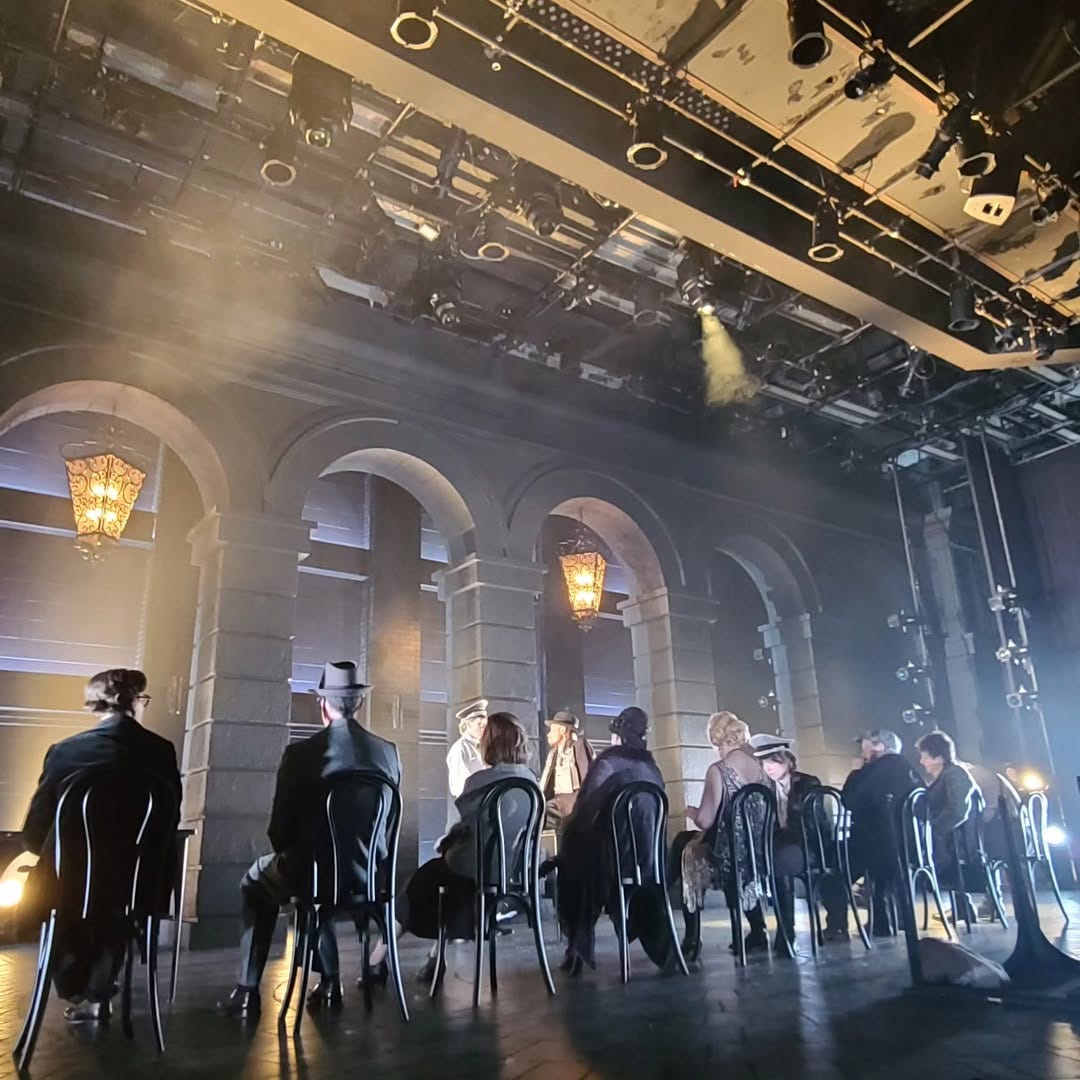
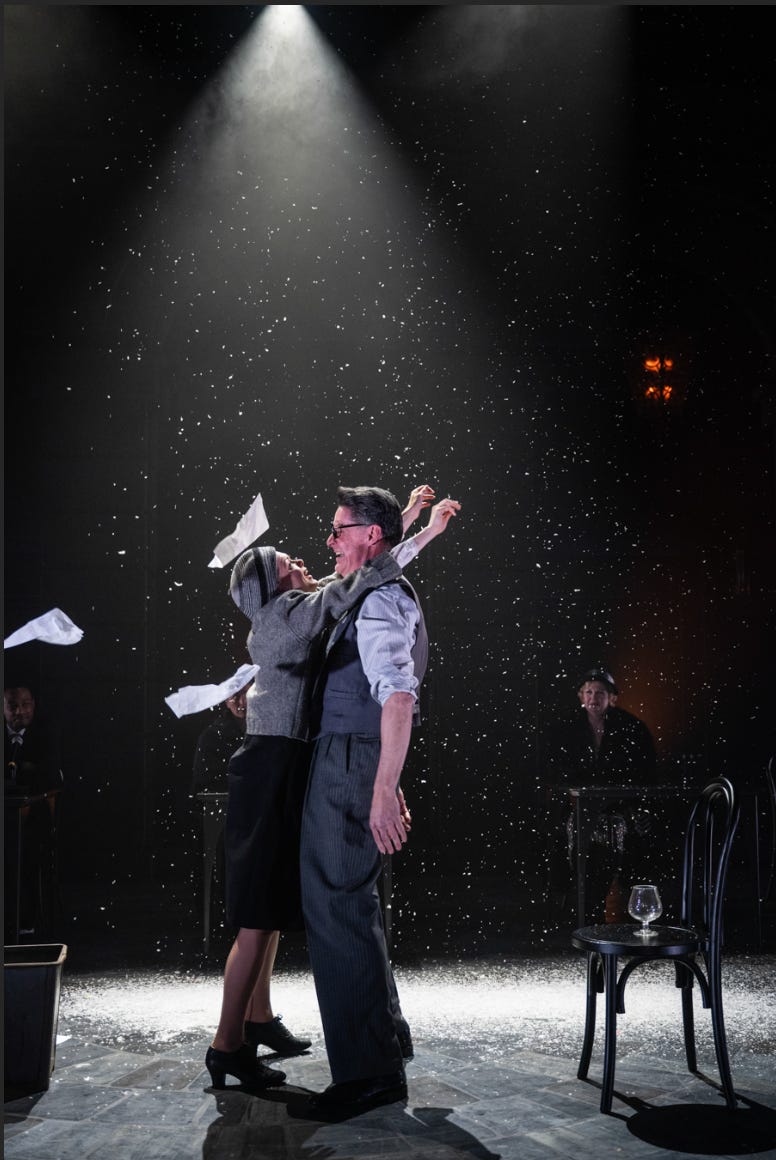
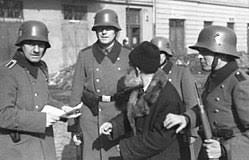
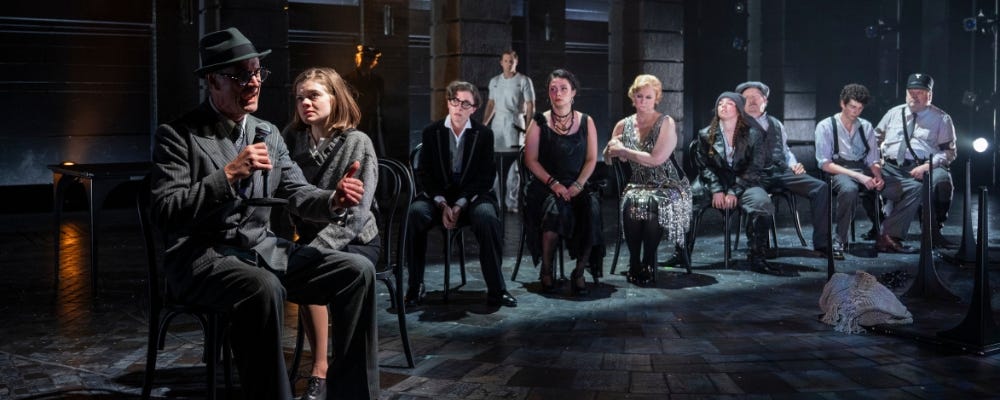
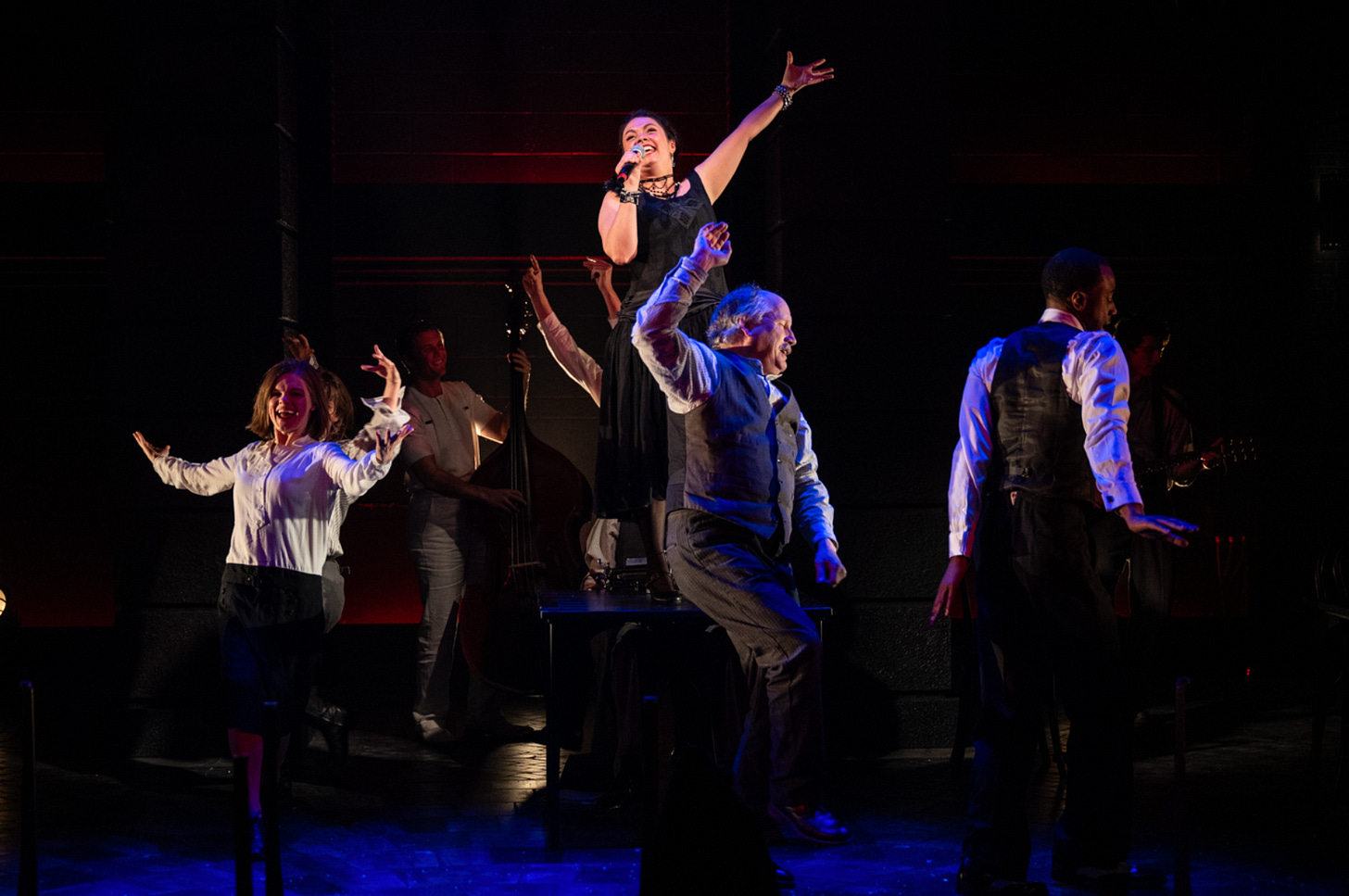





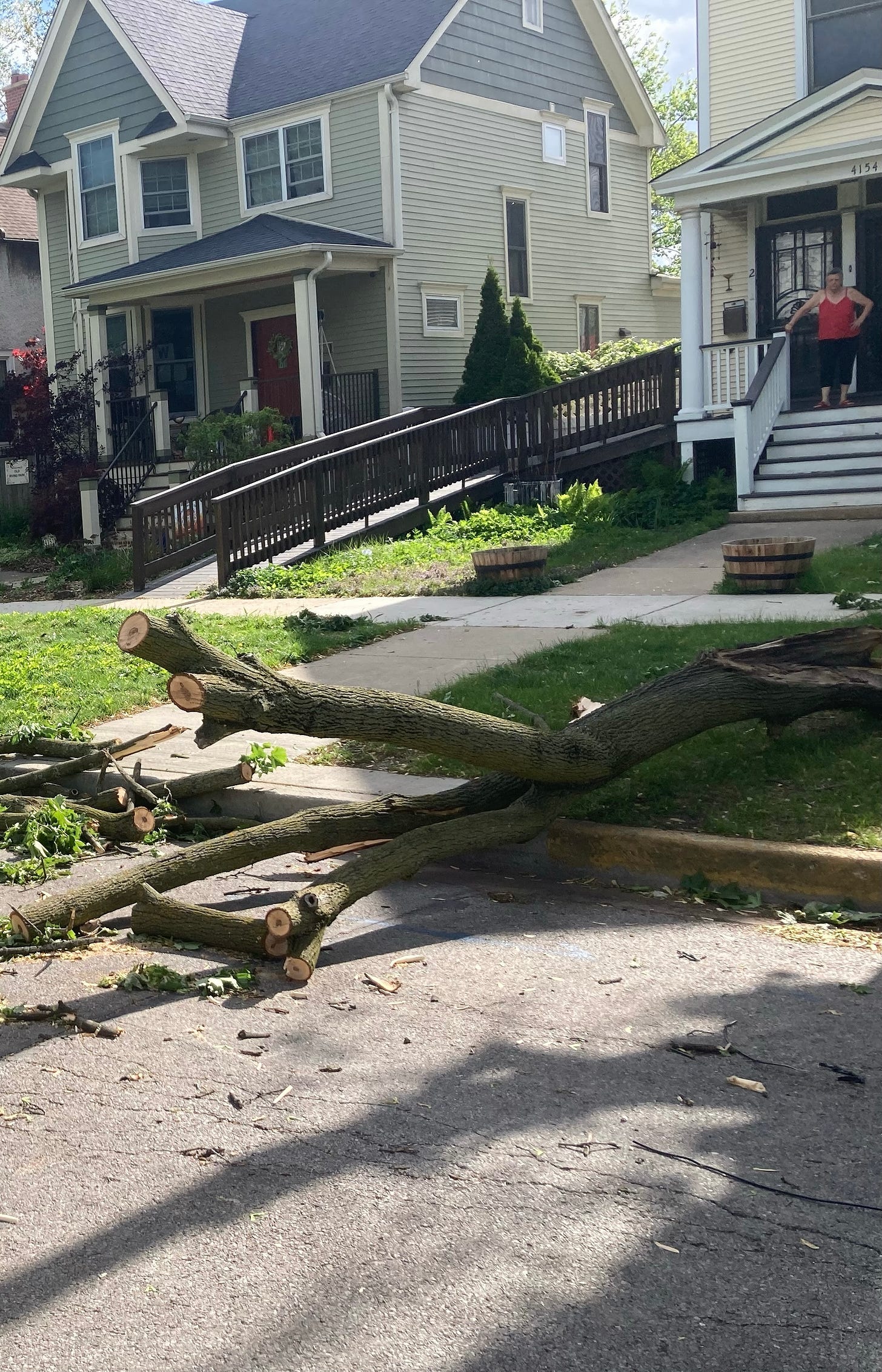
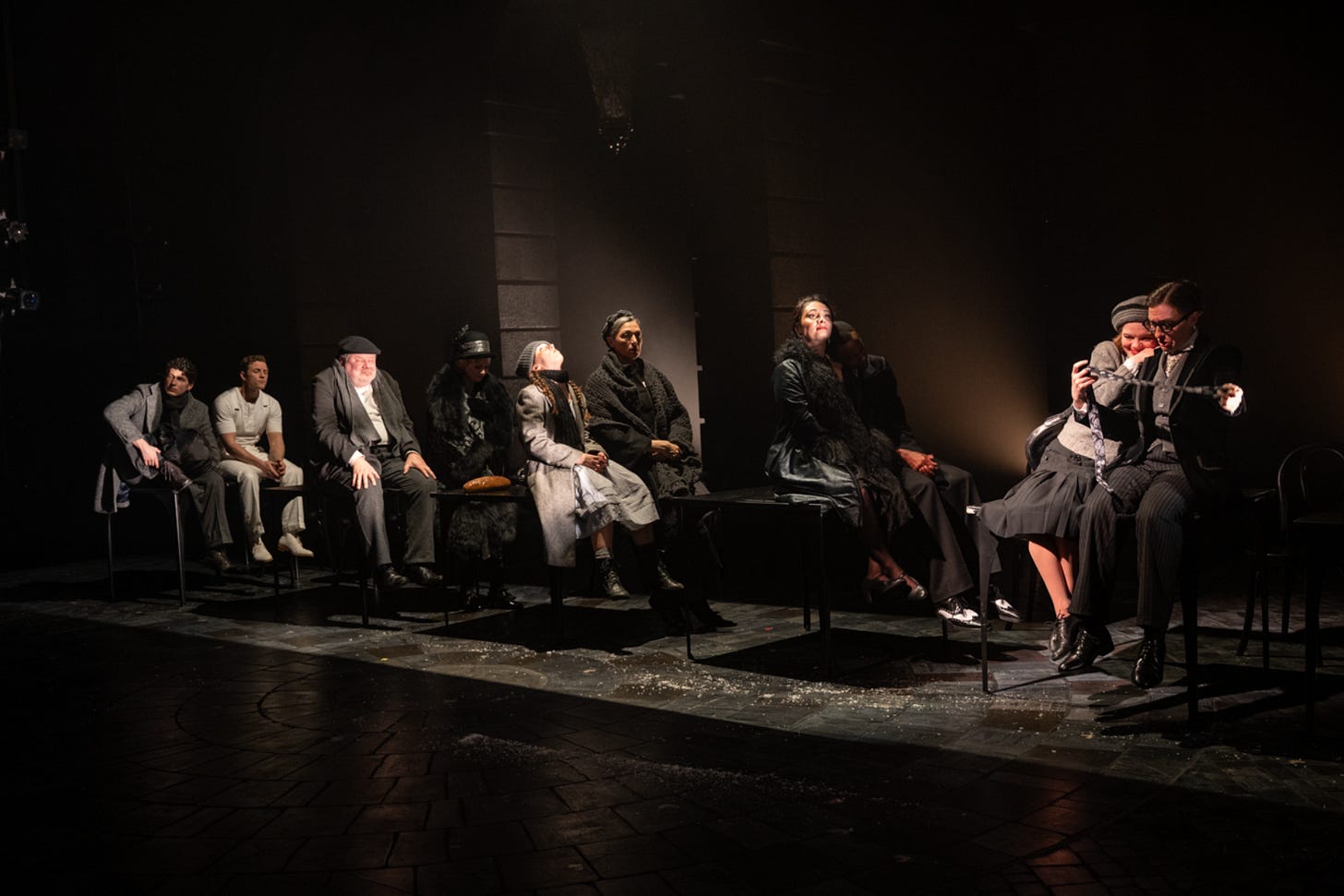

You walked the WW2 tightrope masterfully. In short: you are now indebted to the Fuhrer for at the least not needing a new windscreen.
What a skillful review. Reading it I felt a tangible sense 'loss' at not having seen the play. Well done, you.
And yes, we must tease out art from history, especially when that history is an artful weaving of facts and fiction, currently being undone.
Strange, challenging and wonderful times.
I honestly believe art - creativity in all forms - is on the rise as a primary value and reflection of what it is to be human. What has been oppressed about us, is coming back with force.
Loved this. Thank you, Tonika.